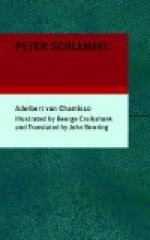Louis Adelbert de Chamisso was born January 27, 1781, at Beaucourt, in Champagne. At the Revolution, he left France with his parents, and came to Berlin, where, in 1796, he was appointed page to the King, and soon after had a commission given him in the army. He applied himself with much ardour to acquire the German language, and felt great interest in the study of its literature, particularly its poetry and philosophy, and was most attracted by those writers whose character presented the greatest contrast to that of his own countrymen. By intercourse with the learned, and by the friendships which he formed, he soon became thoroughly German, which he proved by his poems, which were distinguished above the crowd of such compositions by the originality of their style, and peculiar vigour. From 1804 to 1806 he published the “Almanack of the Muses,” in conjunction with Varnhagen von Ense. At the peace of Tilsit he left the army, and visited France, when his family obtained back part of their possessions. At this time he held, for a short period, a situation as Professor at the school of Napoleonville, but soon returned to Germany, devoting himself wholly to a literary life, and in particular to the study of natural history. During his visit to France, he spent some time with Madame de Stael, whom he also visited in Switzerland. In 1811 he returned to Berlin; and in 1813 he wrote his “Peter Schlemihl,” which marked him out as a man of distinguished and original genius. It was published in 1814 by his friend Fouque. When Count Runnjanzow resolved on undertaking a voyage round the world, he invited Chamisso to accompany him as naturalist to the expedition—an invitation which he gladly embraced. The ships left Cronstadt in 1815, and returned in 1818; and although the discovery of a North-West passage—the great object of the expedition—was not attained, yet extensive acquisitions were made in every department of scientific research. Chamisso’s share in the voyage is recorded in the third volume of the account of it published at Weimar in 1821, and does honour to his spirit of careful observation and his accuracy. He now again fixed his residence at Berlin, from whose university he received the degree of doctor in philosophy. An appointment at the Botanic Garden allowed him full liberty to follow up his favourite pursuit of natural history, and bound him by still stronger ties to his second fatherland. He now wrote an account of the principal plants of the North of Germany, with views respecting the vegetable kingdom and the science of botany: this work appeared at Berlin in 1827. Poetry, however, had still some share of his attention; and he continued, during the latter years of his life, to maintain his claims to an honourable place among the poets of Germany. Several of his ballads and romances rank with the most distinguished of modern times in this branch of composition. Surrounded by a circle of attached and admiring friends, Chamisso continued thus entirely engaged till his death, in 1839, leaving behind him a name and works which posterity “will not willingly let perish.”




